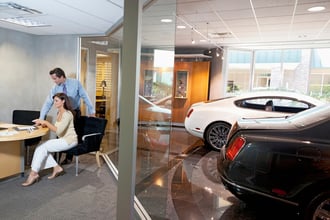
You probably know that the global research company J.D. Power & Associates does an annual ranking of automotive brands. Now in its thirtieth year, “the 2016 U.S. Initial Quality Study is based on responses from more than 80,000 purchasers and lessees of new 2016 model-year vehicles surveyed after 90 days of ownership. The study was fielded from February through May 2016.”
Consumers pay attention to these ratings while manufacturers covet them because those garnering top honors are quick to advertise their accomplishments with the hope of increasing sales.
Like its predecessors, the 2016 J.D. Power U.S. Initial Quality Study is deeply flawed. Most people think it rates dependability, reliability and frequency of repair — in other words, “Is this car likely to break down and leave me stranded?” That assumption is simply not true because the survey focuses on things that are not important. The moral of this story is for auto dealerships to focus on things that are.
Survey Components
 The survey has eight functional areas, all equally weighted. Most complaints in the 2016 study deal with things that have nothing to do with dependability: poor connectivity of Bluetooth, problems with voice recognition technology, or excessive brake dust. These minor inconveniences are equally weighted with engine and transmission failure!
The survey has eight functional areas, all equally weighted. Most complaints in the 2016 study deal with things that have nothing to do with dependability: poor connectivity of Bluetooth, problems with voice recognition technology, or excessive brake dust. These minor inconveniences are equally weighted with engine and transmission failure!
In lieu of this sort of nonsense, most consumers really want to know critical factors such as “what is the estimated maintenance cost in the first 100,000 miles?”
J.D. Power has sensitized American buyers to new terms such as “fit and finish” and “build quality.” Over the years, it has convinced American car buyers that the Japanese manufacturers, particularly Lexus, were superior to domestic offerings. In fact, Lexus, which I call “the Eddie Haskell of cars,” has dominated this survey for the last five years in a row. Where is the truth here?
Well, who better to turn to than Bob Lutz, the most knowledgeable person in the entire worldwide automotive industry, and one who has held top positions at BMW, Ford and Chrysler, and was Vice Chairman of G.M.?
“Today, the three U.S. companies are turning out some of the best cars available in the world, regardless of price class. Quality, reliability and fuel consumption rival those of the Asians while dynamic qualities such as ride, handling, steering, brakes and fit and finish often trounce those of the Germans. The last remaining challenge is the depressing time lag before the bulk of the public figures this out. Will the newfound excellence of American cars ever turn the tide? It’s doubtful in an age where many high achievers openly state that they would very much like an American car, but can’t face the social stigma of being the only family at the country club without one of the German triad.”
2016 Survey Rankings
This year, Kia ranked first with 83 problems reported per 100 vehicles, just ahead of Porsche’s 84. I’m not surprised at Kia’s showing; the Koreans take this sort of thing very seriously and undoubtedly designed and built the car around these sort of measurements. But Porsche’s high ranking is very dubious.
Other than the Chevy Vega, Oldsmobile diesel or Cadillac V4-6-8, few manufacturers have turned out products with such dismal reliability as Porsche.
Perhaps the best example is the GT3. Car expert Jack Baruth has reported that engine fires on the GT3 were so rampant that the factory replaced the motors in all 785 cars sold in the U.S. But wait – there’s more.
The 2.7 litre 911 was notorious for total engine failure in less than 50,000 miles. Typical issues included such things as oil leaks at the rear main seal, cylinder head failure, porous engine blocks, intermediate shaft failure, cracked cylinder heads, cracked cylinder linings, and more.
I would put about as much faith in a J.D. Power survey of Porsche reliability as I would a survey by MasterCard on the use of cash and checks in the country. Furthermore, you can bet that the typical original Porsche owner does not put a lot of mileage on the car in the first three years and always has it serviced by the factory dealer where known problems are addressed without a recall or without the owner even knowing what was fixed.
Survey Takeaways
As mentioned earlier, consumers should focus on what’s important. Porsche owners focus on what’s important to them: prestige and image versus reliability and dependability. People buying a car at the bottom of the market, such as Kia, are not focused on how they look behind the wheel, but they are concerned about not spending money on repairs.
As Bob Lutz said, even the least expensive car today (the Kia) is built to a very high standard. Given the pervasiveness of U.S. government standards for crashworthiness, fuel economy, emissions and more, this isn’t too surprising. There just aren’t any low quality cars sold today in America. So what lessons are there to learn in this discussion about J.D. Power’s survey methodology?
- The metrics of the study are important. When you design a survey, one can determine the desired results just by the way the questions are written.
- Focus on the customer. Who is the beneficiary of the J.D. Power survey? Is it the consumer or is it the manufacturer who might hire J.D. Power as a “consultant” sometime down the road?
- Focus on what is really important. For the new car buyer, this means little or no money spent on maintenance and repairs for the first 50,000 miles. Personally, I think this is why so many cars are leased today — people just don’t want to worry about future expenses.
Auto Dealership Focus
 When we sit down with an auto dealership, we propose that sales managers will sell an extra 5 – 10 cars per month or more with our help. Naturally, they are skeptical.
When we sit down with an auto dealership, we propose that sales managers will sell an extra 5 – 10 cars per month or more with our help. Naturally, they are skeptical.
Dealers are focused on our fees or rumors about check guarantee companies not paying claims. They also dwell on having to train their staff to use a check imager and run all the checks through the imager.
The reality is that those concerns are merely distractions from what is really important, namely: “How can we help dealers make a sale happen that would otherwise not happen if we did not offer payment solutions to buyers at the point of sale and help the dealership close the sale?” Getting the “tail lights over the curb” is all that’s important. Period.
There are other reasons of course:
- Some auto dealerships want to be able to see everything happening in all their stores today when they log into our portal tomorrow. We help them do that.
- Some dealers want to absolutely minimize the opportunity for theft or fraud, which we can do if every single check in the dealership is run through our imager and tied to a daily reconciliation.
Finally, let’s focus on what is truly important rather than the smoke and mirrors. At CrossCheck, we focus on what auto dealerships really need because we have thousands of clients in the auto industry.
Consumers are all over the lot when it comes to maintaining focus, but as a business owner, you must focus on what is truly important in your business, which is typically the monthly sales numbers. Our C.A.R.S. program is here to help you do just that.
C.A.R.S. offers Multiple Check, Check on Delivery (COD) for the Parts and Service department as well as loaner equipment. With each authorized check, funds are automatically processed and deposited into your dealership's account while online reporting allows easy access to status and activity 24/7/365. Download our free guide to learn more.



